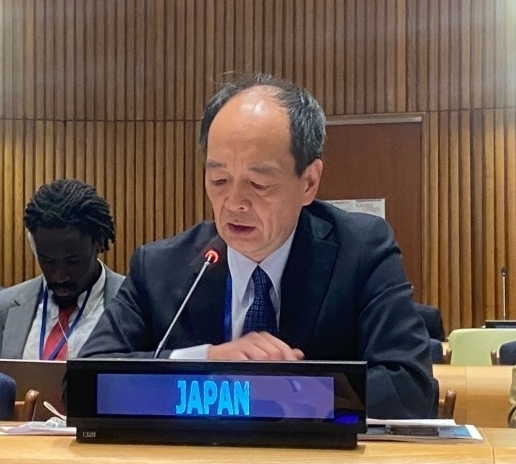UNDP/UNFPA/UNOPS執行理事会第2回定例会UNDP総裁との対話における山中大使ステートメント
令和5年8月30日

Administrator Steiner,
I thank you for your comprehensive statement, rich with many concrete examples.
This year marks the halfway point toward the achievement of the SDGs. The challenges to sustainable development are immense, diverse and intertwined. Many developing countries face several interlinked crises, which have delayed or derailed their efforts to achieve the SDGs and further widened the financing gap.
As the inflow of private funds to developing countries greatly overwhelms that of public funds such as ODA, it is essential to mobilize and channel domestic resources and private funds toward development. Japan has taken the lead in assisting developing countries in this area.
Development finance must be transparent and fair, and it must not undermine the debt sustainability of developing countries. Japan therefore calls on all creditors and debtor countries to adhere to international rules and standards, and to promote development finance that leads to balanced and sustained growth. In Mongolia and Bangladesh, the Japan International Cooperation Agency (JICA) has been implementing projects to improve tax policy development and tax collection capacities, as well as public financial management skills.
Japan also has taken a leading role in financing global issues. Japan has pledged to provide up to $70 billion USD from both the public and private sector to support climate change countermeasures in developing countries over the five years until 2025, including about $14.8 billion USD in adaptation assistance. In the area of climate change, Japan, through JICA, has also been working toward the goal of training 10,000 personnel in climate change countermeasures by 2030, and has already trained a total of 6,735 officials as of the end of 2022.
Japan is contributing approximately $23 million USD toward decarbonization and climate change adaptation projects being implemented by UNDP in 16 countries and regions. Japan expects that a green transformation, including decarbonization, and climate change adaptation measures will be promoted in developing countries and countries vulnerable to climate change risks through these projects.
As Administrator Steiner stated, the oil transfer operation from the FSO Safer to the safe replacement vessel has been successfully implemented, eliminating the risk of a massive oil spill in the Red Sea. Japan, as one of the contributing countries to the project, expresses its admiration and gratitude for the perseverance of the UN agencies and personnel involved in achieving this difficult milestone, especially UNDP. Given the significance of preserving the UN’s international crisis response capabilities, Japan remains committed to contributing further to fill the financial gap, over and above its previous contributions.
Building upon the achievements of G7 Hiroshima Summit and looking ahead towards the G20 Summit, the SDG Summit, and COP28, Japan will lead the way in achieving the SDGs in a comprehensive manner, under the guiding principle of human security, and demonstrating solidarity with various stakeholders.
Finally, Japan maintained its contribution level to UNDP’s core budget in 2022 despite the difficult financial situation and contributed to UNDP's activities as a top donor. We will continue to strengthen our partnership with UNDP.
I thank you.
